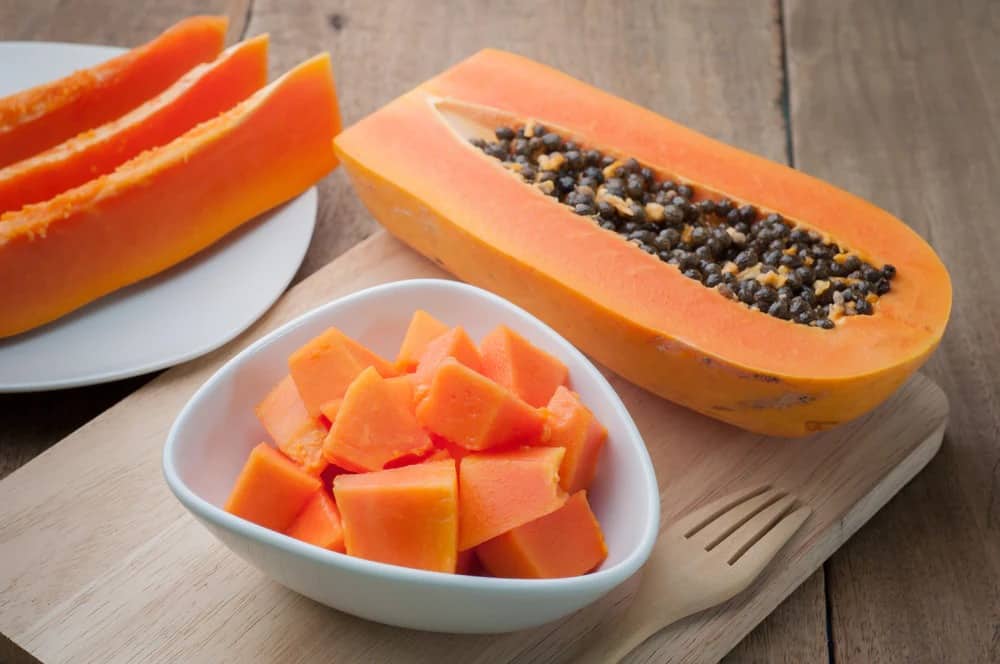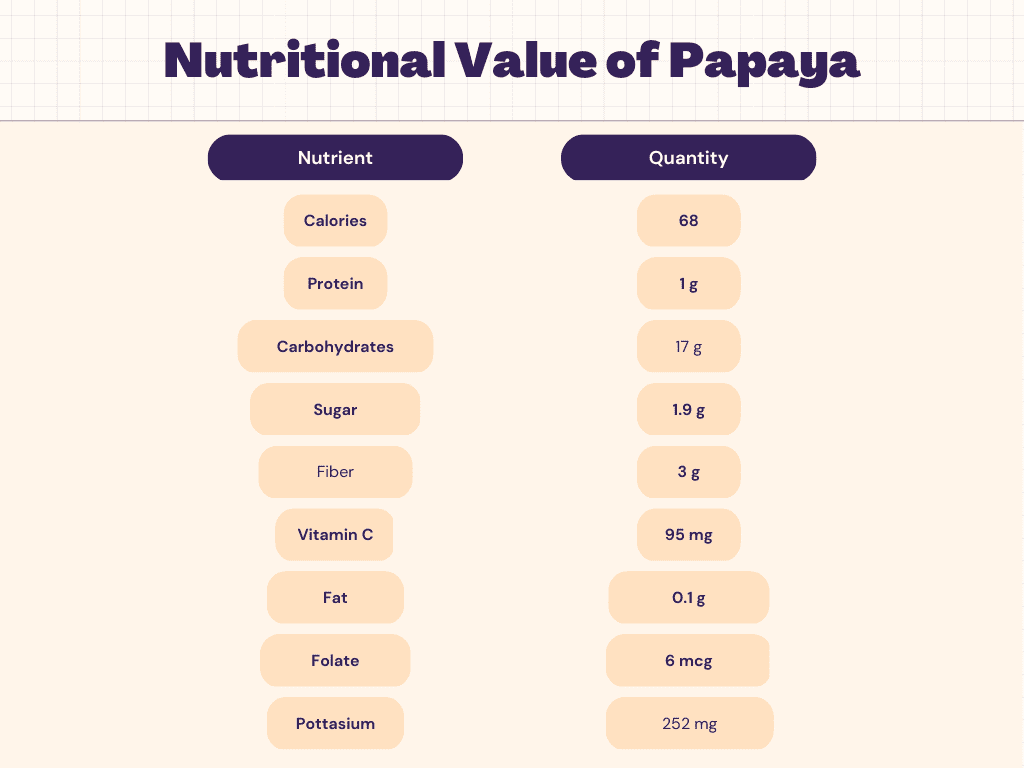Papaya is a soft tropical fruit with a yellow-orange color. This type of fruit, belonging to the Caricaceae family, is round and fleshy and available in larger and smaller sizes. Papaya is not just a tasty treat for the taste buds. It is also packed with nutrients and offers several health benefits. Here’s what you need to know about papaya, including its history and nutritional information, as well as tips for choosing and storing it. Papaya is great for weight loss because of its low-calorie content. Since the fruit is also a good source of fiber, papaya is not only physically satisfying – it also helps you feel fuller for longer. As a result, you can consume fewer calories throughout the day.
Nutritional Value of Papaya
Nutritional Facts of Papaya
Carbs
Most of the calories in papaya come from carbohydrates. A serving of papaya contains nearly 16 grams of carbohydrates, including fiber (2.5 grams) and naturally occurring sugars (about 11 grams). Papaya has a glycemic index of 60 and a glycemic load of 9.2.
Fats
Papaya has almost no fat and contains less than 1 gram per 1 cup serving.
Protein
Papaya provides less than 1 gram of protein per serving.
Health Benefits of Papaya
Papayas offer a number of health benefits, including:
- Improvement of Skin: Vitamin C is a precursor that our body uses to produce collagen. Since collagen is a critical component for skin integrity, getting enough vitamin C improves your skin’s ability to repair itself.
- Improves Vision: beta-carotene is a form of vitamin A that is consumed in fruits, vegetables, and some protein-rich foods. Vitamin A is critical for vision, and papaya is an excellent source.
- Helps in Digestion: Like most fruits and vegetables, papaya is high in fiber, which is essential for good digestion. In addition to this basic benefit, papaya also contains the papain enzyme. Papain helps break down proteins. If you have trouble chewing or digesting meat, papain before cooking makes it easier to eat.
- Helps in increasing Heart Health: The fiber in papaya helps support heart health. Eating enough fiber (mainly fruits and vegetables) reduces the risk of heart disease. Fiber also increases satiety, which can help with weight management.
- Helps in the prevention of Cancer: Consumption of high-fiber plant foods is an established dietary pattern associated with cancer prevention. In addition, the combination of vitamins A, C, and E in papaya has a strong antioxidant effect, which can reduce free radicals and the risk of cancer.
Vitamins & Minerals in Papaya
Papaya is rich in vitamin C, providing 88.3 milligrams per serving. The recommended intake of vitamin C for most adults is 75 to 90 milligrams, so about 1 cup of papaya provides 100% of vitamin C needs.3 Papaya is also an excellent source of vitamin A, especially the carotenoid lycopene.
Bottom Line
Papaya is full of various antioxidants and enzymes that help the body heal in every way. Regular consumption of papaya can help the body heal from the inside out, making the skin look younger and greatly improving the digestive system.
In short, papaya is good for the whole body. It is recommended to include a dose of papaya in your daily diet to feel better and healthier.
FAQs
How many Papayas can I eat in a day?
You can take about a bowl of papaya (3 thin slices). In addition to green leafy vegetables, sprouts, fresh fruits, and vegetables, you can drink a lot of water. Fruits should be taken early in the morning so that they are well absorbed.
Should I eat a Papaya before or after exercise?
It is such a great post-workout meal and it’s so versatile. Yogurt, milk, mango, banana, strawberries, apples, papaya, dried fruit, seeds – you can do a lot with a fruit smoothie. Add to this that liquid foods are easy to digest and quickly absorbed by the body.
What are the benefits of Papaya?
Papaya lowers cholesterol, strengthens immunity, and helps lose weight.
What is the best time to eat a Papaya?
Papaya can be eaten at night as it acts as a laxative and cleanses the colon. However, fruits should be avoided at least
-5 hours after a meal. So if you want to eat papaya at night, plan your dinner accordingly. Yes, you can eat papaya at night because it helps cure constipation due to its rechana (laxative) properties.










